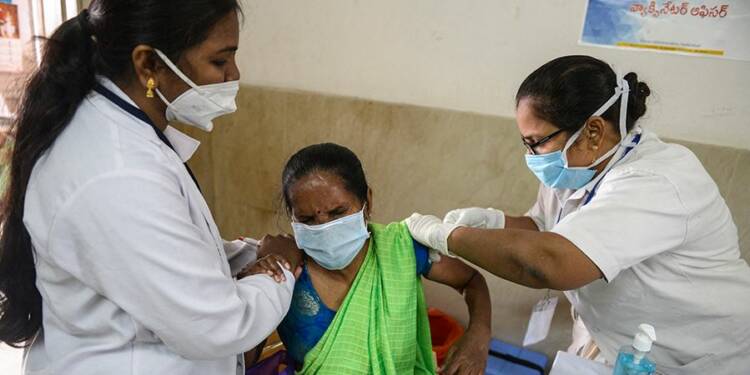The fight against Covid-19 can be defeated in the long term only using vaccines. There is no other way around the pandemic, and all strategies – whether they be restrictive lockdowns or the triple-T formula will only provide temporary respite from consecutive waves. Sars-Cov-2 has shown an incredible ability to mutate in a considerably short span of time, and this ability should ideally force the government of India to vaccinate people at a war footing like there is no tomorrow. Underperforming states need to be pulled up and punished, while those managing to inoculate a significant number of people every day must be rewarded.
India’s daily vaccination numbers for the past few days have been far from motivating. In fact, from a daily peak of 46.4 lakh first doses on April 7, an average of just about 1.8 lakh people are being vaccinated on a daily basis presently. At this pace, it would take years for India to significantly inoculate its population so as to arrest the spread of the ever-mutating Covid-19 virus. The more time we give to the vaccine to spread, the more it mutates in order to survive. Ideally, we should not be waiting for the mutation which, heavens forbid, can dodge vaccines.
According to an India Today report, a little more than 13 crores (130 million) people have been partially vaccinated since the country’s inoculation programme began on January 16, 2021. With this pace, production and supply capacities, it would take nearly three years to inoculate the entire eligible population with the first dose. Considering the double dose began 28 days after the vaccination drive started, it would take around ten years to fully vaccinate all the people in the world’s second-most populous nation at the current rate.
So far only 12 states have started vaccinating folks in the 18-45 age group. Of these, Gujarat leads the pack with max jabs in the younger age group. Insights from @IndiaToday Data Intelligence Unit (DIU). https://t.co/KrC2feTNwm pic.twitter.com/woEoNvIVvr
— Rahul Kanwal (@rahulkanwal) May 6, 2021
Although inoculating the entire population is not entirely necessary, however, that by current trends, it will take 10 years to do so suggests how inoculating a significant amount of the population too will take years. India needs to rethink its vaccination policy and have a more non-traditional approach to its inoculation campaign. The country’s first drive-in vaccination centre has opened up in Gujarat’s Kutch. If sufficient vaccines are available across the country – which is not presently the case, drive-in centres could revolutionise our vaccination campaign. Other non-traditional methods too must be actively deliberated upon. Unprecedented times call for unprecedented measures.
India needs a non-traditional approach to vaccinating people against Covid-19. This could be one.
We need a vaccine overflow, and we need it now. Current numbers of daily vaccination are demotivating at best and horrifying at worst.
Kudos to the Gujarat government! https://t.co/PPX4rsagBC
— Sanbeer Singh Ranhotra (@SSanbeer) May 7, 2021
State governments are going to play a big role in securing the health of their people very soon. As vaccines for the 18-44 age group begin flowing in, it would be contingent upon the state governments to ensure that people get vaccinated against Covid-19 at the earliest. Getting vaccinated must be projected as a national duty rather than as a luxurious choice which people are free to make. According to available data, at least three lakh (300,000) doses have been wasted so far. Among major states, Tamil Nadu, Assam, Manipur, and Haryana account for most of the waste, according to the Ministry of Health and Family Welfare.
Kerala, on the other hand, has administered more than available doses by making use of the extra doses that are wasted in each vial – a feat for which the state has even earned public praise from Prime Minister Narendra Modi. All states must ensure minimal vaccine wastage. At a time when vaccine supplies are in deficit, wasting available doses is something the nation cannot afford.
In Chhattisgarh, meanwhile, the COVID-19 vaccination of those aged between 18 and 44 has been halted. The reason? The Congress government in the state decided arbitrarily that Antyodaya cardholders would be inoculated first, followed by those below the poverty line and then those above it. The Chhattisgarh High Court was then inundated by petitions challenging this rather brazen sub-classification of vaccine eligibility by the Congress government, following which the vaccination drive itself was temporarily halted.
Frankly, we are slacking in our campaign to vaccinate people, thereby giving time to the virus to overpower us. An immediate reversal of this lethargic trend is required by all stakeholders – whether it be the Centre, state governments or vaccine manufacturers.
